#generative ai tools for software development
Explore tagged Tumblr posts
Text
An animator once told me that the best thing to do is go out in your yard or coffee shop and watch people and animals move.
As you watch, draw the movements.
I dance. Here’s a chalk drawing I did recently at a pride event about dancing with my daughter/ on my own in a costume she makes me wear a lot.
I kept my line art pretty simple here.
But, you can see the progression of the movement.
Granted, this is a movement I do a fair amount, so it’s something I can literally feel.
However, there are a *ton* of videos of dancers you can find online to sketch from.
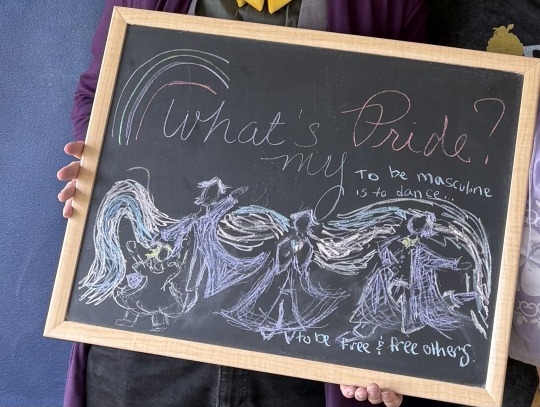
Also, like don’t be afraid to copy master artists in your own hand at a museum or something. People do that all the time to learn.
Eventually, one day, you start going off script from the copy and doing something bonkers, and THAT’S where your style develops. It’s what makes writing fic a useful tool for my writer folks as well.
Eventually, you suddenly find yourself developing your own style and your own world from the worlds you’ve seen.
When I draw landscape? You can DEFINITELY see Van Gogh’s influence in how I paint.
However, I prefer water color and acrylic to oils.
And, you can also see a little bit of some more classical pastoral artists as well. I like to catch a *little* more detail than a true impressionist would.
This is what makes human copies different from AI copies. I can paint Starry Night in water color, but my love for the Impressionist movement is going to come through in my copy. What I’ve studied of their history is going to come through in that copy. My devotion to Van Gogh’s story is going to come through in that copy.
This is what makes humans different from computers. We learn by copying too, but what we learn is different.
I learned that I liked the swirling movement that Van Gogh so often incorporates into his brush strokes because it reminds me of the way music looks when I hear it. It reminds me of a sound wave.
So, I want to incorporate it into my own painting.
I learned that I loved the detail of sheep’s wool and stars in traditional pastoral work, so even in those swirling strokes - I want those shapes to remain distinctive.
That meant I needed a medium that could accommodate me.
Acrylic is often the best for that.
Water color can work, but generally I make it multi-medium and will draw on top with pencil. Or scan it into a computer (when I have software to do so available- I haven’t in decades) and sketch over the top in an editing program to add detail/ characters or whatever.
But, all of this started by copying the masters in my own way, watching things in the real world, and then combining them in a style that was mine.
All of that + what’s listed above is a part of learning. And, heck - touching grass? Observing nature and people - that’s all free my dudes.
Can't afford art school?
After seeing post like this 👇

And this gem 👇
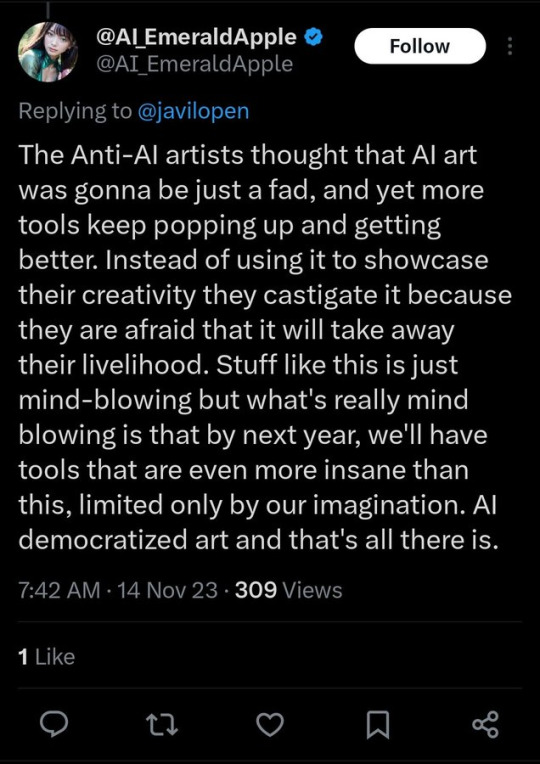
As well as countless of others from the AI generator community. Just talking about how "inaccessible art" is, I decided why not show how wrong these guys are while also helping anyone who actually wants to learn.
Here is the first one ART TEACHERS! There are plenty online and in places like youtube.
📺Here is my list:
Proko (Free)
Marc Brunet (Free but he does have other classes for a cheap price. Use to work for Blizzard)
Aaron Rutten (free)
BoroCG (free)
Jesse J. Jones (free, talks about animating)
Jesus Conde (free)
Mohammed Agbadi (free, he gives some advice in some videos and talks about art)
Ross Draws (free, he does have other classes for a good price)
SamDoesArts (free, gives good advice and critiques)
Drawfee Show (free, they do give some good advice and great inspiration)
The Art of Aaron Blaise ( useful tips for digital art and animation. Was an animator for Disney)
Bobby Chiu ( useful tips and interviews with artist who are in the industry or making a living as artist)
Second part BOOKS, I have collected some books that have helped me and might help others.
📚Here is my list:
The "how to draw manga" series produced by Graphic-sha. These are for manga artist but they give great advice and information.
"Creating characters with personality" by Tom Bancroft. A great book that can help not just people who draw cartoons but also realistic ones. As it helps you with facial ques and how to make a character interesting.
"Albinus on anatomy" by Robert Beverly Hale and Terence Coyle. Great book to help someone learn basic anatomy.
"Artistic Anatomy" by Dr. Paul Richer and Robert Beverly Hale. A good book if you want to go further in-depth with anatomy.
"Directing the story" by Francis Glebas. A good book if you want to Story board or make comics.
"Animal Anatomy for Artists" by Eliot Goldfinger. A good book for if you want to draw animals or creatures.
"Constructive Anatomy: with almost 500 illustrations" by George B. Bridgman. A great book to help you block out shadows in your figures and see them in a more 3 diamantine way.
"Dynamic Anatomy: Revised and expand" by Burne Hogarth. A book that shows how to block out shapes and easily understand what you are looking out. When it comes to human subjects.
"An Atlas of animal anatomy for artist" by W. Ellenberger and H. Dittrich and H. Baum. This is another good one for people who want to draw animals or creatures.
Etherington Brothers, they make books and have a free blog with art tips.
As for Supplies, I recommend starting out cheap, buying Pencils and art paper at dollar tree or 5 below. For digital art, I recommend not starting with a screen art drawing tablet as they are more expensive.
For the Best art Tablet I recommend either Xp-pen, Bamboo or Huion. Some can range from about 40$ to the thousands.
💻As for art programs here is a list of Free to pay.
Clip Studio paint ( you can choose to pay once or sub and get updates)
Procreate ( pay once for $9.99)
Blender (for 3D modules/sculpting, ect Free)
PaintTool SAI (pay but has a 31 day free trail)
Krita (Free)
mypaint (free)
FireAlpaca (free)
Libresprite (free, for pixel art)
Those are the ones I can recall.
So do with this information as you will but as you can tell there are ways to learn how to become an artist, without breaking the bank. The only thing that might be stopping YOU from using any of these things, is YOU.
I have made time to learn to draw and many artist have too. Either in-between working two jobs or taking care of your family and a job or regular school and chores. YOU just have to take the time or use some time management, it really doesn't take long to practice for like an hour or less. YOU also don't have to do it every day, just once or three times a week is fine.
Hope this was helpful and have a great day.
#art#artist#digital art#art help#art advice#useful#useful things#art tips#pip does life#pip draws sometimes
106K notes
·
View notes
Text
AI Software Development Company | SynergyTop
Confused by the myriad of AI tools available for software development? Want to harness the power of AI but don't know where to start? This comprehensive guide explores the top AI tools that can revolutionize your software development process. Learn about the benefits, challenges, and practical applications of these tools to enhance your efficiency, improve code quality, and accelerate your development lifecycle. Dive into our curated list of AI tools, backed by expert insights from SynergyTop, and discover how to seamlessly integrate AI into your workflows for maximum impact. Read more - https://synergytop.com/blog/ai-tools-for-software-development/
0 notes
Text
Engineering Innovation Through Intelligent Design - Atcuality
Atcuality empowers businesses with next-gen technology built for humans and enhanced by AI. From concept to code, our team delivers custom software products that are responsive, efficient, and beautiful. We understand that every brand has its own story and needs, so we design and develop with flexibility and purpose. For clients looking to elevate digital performance, we specialize in embedding intelligent features directly into their platforms. This is where an AI powered application becomes a game changer—capable of learning from user behavior, predicting actions, and automating decisions in real time. Our solutions don’t just work—they adapt. Whether you're launching a SaaS product, mobile app, or internal tool, Atcuality brings your vision to life with intelligence and precision.

#artificial intelligence#ai applications#augmented and virtual reality market#digital marketing#augmented reality#emailmarketing#website development#web design#web development#information technology#ai model#ai image#ai artwork#ai art#ai generated#chatgpt#technology#ai development#ai digital art#ai services#ai security#ai technology#ai tools#ai developers#ai chatbot#ai cutie#ai character#software development#software engineering#software company
2 notes
·
View notes
Text
#ai#image search#free ai tools#free business tools#ai art#ai generated#ai image#artifical#artifical intelligence#ai artwork#ai software development#ai software engineer
9 notes
·
View notes
Text
#image search#ai#ai art#ai artwork#ai generated#ai image#ai software development#ai software engineer#artifical#free ai tools#artifical intelligence
8 notes
·
View notes
Text
Apple AI Vibe Coder
#AI Vibe#Apple AI#Anthropic Claude#AI coding assistant#AI for developers#Xcode AI#Swift Playgrounds#AI programming tools#Claude 3#Apple developer tools#Generative AI coding#AI-powered IDE#Machine learning coding assistant#Code automation#Software development AI#ai latest update#artificial intelligence#ai news
1 note
·
View note
Text
AI Coloring Book Creator Review: A Game-Changer for Passive Income
#AI Coloring Book Creator#coloring book software#passive income generator#AI-powered design#print-on-demand books#digital content creation#creative side hustle#online business tools#coloring book marketplace#niche product development
0 notes
Text
0 notes
Text
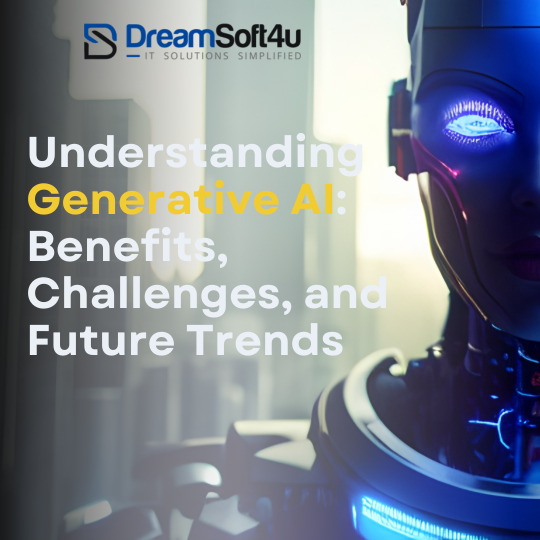
Discover the power of Generative AI! From creating high-quality content to revolutionizing business automation, Generative AI is shaping the future of technology.
✅ Benefits: Automates tasks, enhances creativity, and improves efficiency. ⚡ Challenges: Ethical concerns, data security, and potential biases. 🔮 Future Trends: AI-driven innovation in healthcare, marketing, and automation.
Stay ahead with the latest insights on Generative AI. Contact us for expert guidance or AI solutions tailored to your needs!
1 note
·
View note
Text
How as a Principal Software Engineer I Leverage Generative AI in My Workflow
🚀 How I Leverage Generative AI as a Principal Software Engineer 🚀 Generative AI isn’t replacing developers—it’s empowering them. I integrate AI tools into my workflow to: ✅ Generate & optimize code ✅ Automate debugging & error resolution ✅ Make smarter architectural decisions ✅ Improve documentation & knowledge sharing ✅ Enhance DevOps automation The result? Faster development, cleaner code, and more time for innovation. Read more on how I strategically use AI to amplify my engineering process. #Innovation #Technology #SoftwareEngineering #AI #Automation #MachineLearning #DigitalTransformation #Productivity #GenerativeAI #Future #Entrepreneurship #Startups #Coding #ArtificialIntelligence #DevOps #SoftwareDevelopment
Introduction Generative AI is not a replacement for human ingenuity—it’s an amplifier. As a Principal Software Engineer, I treat it like any other powerful tool in my stack. It helps me iterate faster, automate repetitive tasks, and unlock new levels of efficiency without sacrificing quality. Whether it’s accelerating prototyping, debugging code, or even refining technical documentation,…
#AI Tools#Automation#Digital Transformation#Generative AI#Machine Learning#Productivity#Software Development#software engineering
0 notes
Text
What are the Benefits of Using a Code Generator for Developers?
Discover how code generators save time, reduce costs, and improve productivity for developers by automating repetitive tasks and streamlining workflows.
Code generators are becoming essential for modern developers, simplifying the process of writing code. By automating repetitive tasks, they save valuable time, reduce errors, and boost productivity. Instead of focusing on basic code structure, developers can concentrate on solving more complex problems. In this article, we’ll explore the practical benefits of using a code generator and how it can…
#AI Programming#Automation For Developers#Code Generator#Developer Tools#Development Tools#Low Code Platform#Software Development
0 notes
Text
Global Generative AI in Software and Coding Market: Projections and Growth Opportunities and 2024 Forecast Study
Global Generative AI in Software and Coding Market: Revolutionizing the Future of Development
The Global Generative AI in Software and Coding Market is experiencing an extraordinary surge, driven by advancements in artificial intelligence, machine learning, and deep learning technologies. In recent years, the intersection of AI and software development has sparked innovations that promise to redefine coding practices, enhance efficiency, and reduce human error. This article delves into the trends, growth projections, key drivers, challenges, and the future of generative AI in the software development landscape.
Introduction to Generative AI in Software and Coding
Generative AI refers to artificial intelligence systems that are designed to generate new content, solutions, or even code autonomously. In the context of software development, this technology can assist developers by automatically writing code, suggesting improvements, optimizing algorithms, and even debugging. The integration of generative AI into coding practices is poised to significantly transform the software development process by improving productivity, reducing manual effort, and enabling faster time-to-market for software applications.
The Global Generative AI in Software and Coding Market is expected to see a dramatic rise, with a projected value of USD 31.6 million in 2024. This is anticipated to grow at a compound annual growth rate (CAGR) of 25.5% from 2024 until 2033, ultimately reaching a value of USD 243.7 million by the end of the forecast period.
Get a Free PDF Sample Copy of this Report@ https://dimensionmarketresearch.com/report/generative-ai-in-software-and-coding-market/request-sample/
Key Drivers of Growth in the Generative AI Market
1. Demand for Efficiency in Software Development
The need for faster development cycles has never been more pronounced. Companies across industries are seeking ways to reduce the time it takes to bring software applications to market. Generative AI tools streamline the development process by automating repetitive tasks like code generation, debugging, and code review. As a result, developers can focus on more complex and value-added activities, improving overall productivity.
2. Rising Adoption of AI and Machine Learning
AI technologies, particularly machine learning and natural language processing (NLP), are at the core of generative AI’s capabilities. With increasing investment in AI, software companies are integrating generative models into their development pipelines to make coding faster, smarter, and more scalable. These AI models can learn from large datasets and generate code based on the patterns they recognize, reducing the need for manual intervention in basic coding tasks.
3. Demand for Code Optimization and Error Reduction
One of the most significant advantages of generative AI is its ability to identify coding errors and optimize existing code. By analyzing vast amounts of historical data, generative AI can detect inefficiencies, bugs, and security vulnerabilities in the code and suggest corrective measures. This is particularly valuable in complex systems, where the sheer volume of code can make manual debugging time-consuming and error-prone.
4. Increased Collaboration Between AI and Developers
Generative AI is not intended to replace developers, but to act as an intelligent assistant. Developers can leverage AI to augment their capabilities, improving collaboration and efficiency. Tools like GitHub Copilot and OpenAI Codex provide real-time suggestions, helping developers to write cleaner, more efficient code faster.
5. Expanding Use Cases Across Industries
As industries continue to digitize, the demand for custom software solutions grows. Generative AI in software development is poised to cater to a wide range of industries, from healthcare and finance to gaming and e-commerce. Each sector can benefit from AI’s ability to accelerate development processes, create personalized solutions, and ensure software quality.
Key Segments of the Global Generative AI in Software and Coding Market
The Global Generative AI in Software and Coding Market can be categorized based on the following key parameters:
1. By Application
2. By End-User Industry
3. By Deployment Mode
Challenges and Barriers to Market Growth
Despite the tremendous potential of generative AI in software development, several challenges exist that could hinder its widespread adoption:
1. Quality Control and Reliability
Generative AI models are not infallible. They may sometimes produce inaccurate or inefficient code, which could lead to system failures. Ensuring the quality and reliability of AI-generated code remains a critical issue that requires ongoing human oversight and intervention.
2. Data Privacy and Security Concerns
The use of large datasets to train generative AI models raises significant concerns around data privacy, security, and intellectual property. Ensuring that sensitive data is handled appropriately and in compliance with regulations like GDPR is essential for maintaining trust in AI-driven systems.
3. Lack of Skilled Talent
While the demand for generative AI tools is on the rise, there is a shortage of skilled AI engineers and data scientists capable of developing and fine-tuning these models. Companies may face difficulty in adopting generative AI fully without investing in training and talent acquisition.
4. High Initial Costs
The deployment of advanced generative AI solutions can require significant upfront investment, particularly for small and medium-sized businesses (SMBs). The high initial costs of developing or purchasing AI-driven development tools may limit their adoption in the early stages of the market.
Competitive Landscape
As the Global Generative AI in Software and Coding Market grows, numerous players are emerging to capture market share. These companies range from established AI giants like OpenAI, IBM, and Google, to smaller specialized startups focused on creating niche solutions for developers. Competitive dynamics are likely to intensify as innovation accelerates, and more developers and organizations adopt generative AI tools.
Key players in the market are focusing on enhancing their AI platforms’ capabilities, integrating with popular development environments, and offering customizable solutions tailored to various industries.
Future Outlook: The Next Frontier of Generative AI in Software Development
The Global Generative AI in Software and Coding Market is poised for extraordinary growth, with an anticipated CAGR of 25.5% between 2024 and 2033. As AI models become more sophisticated, the applications of generative AI in software development will continue to expand.
Key areas to watch in the future include:
FAQs
1. What is generative AI in software development?
Generative AI in software development refers to AI models that automatically generate code, suggest improvements, optimize algorithms, and help detect bugs, thereby automating and accelerating the software development process.
2. How fast is the Global Generative AI in Software and Coding Market growing?
The market is projected to reach USD 31.6 million in 2024 and grow at a CAGR of 25.5%, reaching USD 243.7 million by 2033.
3. What industries are adopting generative AI in software development?
Generative AI is being adopted across various industries, including information technology, healthcare, finance, retail, and manufacturing, due to its ability to automate coding tasks and enhance software efficiency.
4. What are the challenges associated with generative AI in software development?
Challenges include quality control, data privacy concerns, a shortage of skilled talent, and high initial implementation costs.
5. How does generative AI improve coding efficiency?
Generative AI assists developers by automating repetitive tasks, suggesting optimizations, detecting bugs, and improving the overall speed and quality of code production.
Conclusion
The Global Generative AI in Software and Coding Market is on the
cusp of a transformative period. With a projected CAGR of 25.5%, this market promises to revolutionize how software is developed, tested, and optimized. From automating code generation to improving software quality, the potential applications are vast and varied. While challenges such as data security and quality control remain, the overall outlook for generative AI in software development is overwhelmingly positive. As this technology matures, it will continue to reshape the future of programming and make software development faster, smarter, and more efficient.
About Us
Dimension Market Research (DMR) is the ultimate one step solution to all your research needs and requirements. Dimension Market Research is India and US based company, we have headquarter in USA (New York) with offices in Asia pacific region. Dimension Market Research is specifically designed to provide most relevant syndicated, customized and tailor made market research to suit your specific business needs.
#Generative AI#AI in Software#Coding Automation#Software Development#AI Tools#Machine Learning#Artificial Intelligence#Tech Innovation#Future of Software#Software Solutions#AI-Powered
0 notes
Text
My Experience with Galambo, AI image search tool!
I love exploring and learning new things, always searching for tools that can make my discoveries even better. That’s when I found Galambo, an AI-powered search engine for images. It's changed how I find and understand pictures, whether I'm looking for places, services, or the stories behind photos.
From my first try, I was impressed by how easy Galambo is to use and how much info it gives. Even though it's made by a small team, their passion for making a great search tool shines through.
Standout Features of Galambo
Predictive Search
Galambo’s predictive search is amazing. It suggests searches based on my pictures, so I get quick, accurate results. It saves me time and makes searching super easy.
Interactive Search
I love the interactive search. With Galambo, I can click on parts of images to get more info, find related stuff, and learn more about what I'm looking at. It’s fun and educational.
Integration with Other Services
Galambo works well with other stuff too. It connects with maps to find places, links to databases for more details, and syncs with social media for different views. Everything I need is right there.
Privacy and Security
Privacy is important, and Galambo takes care of it. It keeps my info safe with strong security measures. I feel confident using it.
Why Galambo is Special
Galambo has really changed how I learn about the world through images. It’s easy to use, full of info, and way better than old-fashioned searches.
For anyone who wants to explore the world through images and learn more, I really recommend Galambo. It’s a great tool for finding places, stories, and more.
I'm just going to leave the link here: https://www.galambo.com/
#ai#ai software development#ai image#image search#artifical intelligence#software#reverse image search#ai generated#free ai tools
8 notes
·
View notes
Text
Flask vs. Django: Which Framework is Better for Custom Software Development?
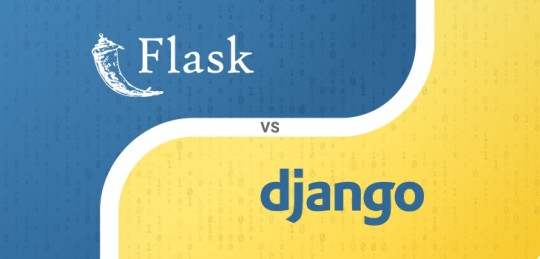
Selecting a framework when building web applications is critically important. Flask Flask is a micro web framework, or you can say it's an example of the minimalistic libraries, and Django The Web Framework for Python are 2 famous frameworks that I have used in my projects. The debate whether to utilize a Web App or Mobile Aspects Development in its equivalent strength has been going on for years and the right choice depends upon the requirements of your project. So, in today's blog we will discourse the divergent aspects of Flask and Django so that you can determine what all is best suited for your custom software development essentials. We will cover how custom software development companies can utilize these frameworks to offer custom digital marketing solutions & special purposeful for manufacturing graduated tax.
Understanding Flask and Django
A micro-framework based on Werkzeug, and Jinja 2 for Python, It is both lightweight and modular, providing adaptability of the pipeline to developers requirements. Flask is frequently used for small projects or applications but it also shines in the areas where we require a lot of customization.
Whereas Django is a high-level Python Web framework that encourages rapid development and clean, pragmatic design. It includes many features out of box what makes it excellent for big projects which need a strong and salable solution.
Key Differences Between Flask and Django
Design and Architecture Philosophy
Flask: Flask is a light-weight framework, it follows the other side of micro-framework that provides basic things to set up web-application and lets you decide on each everything. So you gain more flexibility and possibility to provide as simple components as possible, while using only necessary features of the application for them.
Django follows the “batteries-included” philosophy providing built in features like ORM (Object-Relational Mapping), authentication, and an admin panel along with others. That makes it easy to begin with Django but may be too constrained for customization.
Ease-of-Use and Learning Curve
Flask: Flask is famous for its simplicity and easy to use. It is minimalist in design, and therefore easier for a beginner to use. But with simplicity there also comes challenges, in series of more complex projects you may realise and especially that developers will have to complete such features on their own.
Django: Django has quite a robust feature offering as compared to Flask, which leads to Python developers facing steeper learning curves. But, if a developer learns Django well, they can benefit from its powerful features to build complex applications way faster.
Flexibility and Customization
Flask: Being modular, Flask allows developers to churn on what they really need and plug into their set-up at will. As such, Flask is a versatile framework and well suited for bespoke software development projects where other specific features or integrations are needed.
Django is more featureful and has many built-in tools, but it can also be less flexible than Flask. Expanding an application in Django might sometimes feel shackled by the framework, and even though one can do magic with it -p may need sharp alternatives when there is a peculiar requirement.
Performance and Scalability
With just Flask: Use Flask for small to medium-sized applications due to its lightweight nature. It does scale well and is actually extremely efficient with a moderate amount of traffic, but additional effort and optimization are required for Flask applications designed to handle high levels of web traffic.
Django: Django, has scalability in its very design. It has great built-in features and it better suits for enterprise level applications that have to carry intensive traffic with a lot of complex operations.
Community and Support
Flask has a smaller but active community. Has lots of resources for learning and troubleshooting, but the community support might not be as robust as Django.
Django : Django is supported by a massive and conscious community. That there are more resources, tutorials and 3rd party packages out there for people to use; which can help solve common problems (thus easing the barrier of entry) but also, will lend equal hands in receiving guidance when required.
Use Cases for Flask and Django
Flask is ideal for:
Small to medium-sized web applications
Projects that require a high degree of customization
Applications with simple requirements and minimal dependencies
Rapid prototyping and development of MVPs (Minimum Viable Products)
Django is ideal for:
Large-scale web applications
Projects that require a lot of built-in features and tools
Applications that need to handle high traffic and complex operations
Development teams that prefer a structured and opinionated framework
Custom Software Development with Flask and Django
Custom software development companies often need to choose the right framework based on the specific needs of their clients. Both Flask and Django have their advantages, and the choice between them can significantly impact the success of a project.
Flask for Custom Software Development
Flexibility: Flask’s modular design allows custom software development companies to build tailored solutions that meet the unique requirements of their clients.
Lightweight: Flask’s lightweight nature makes it ideal for projects that need to be developed quickly and efficiently.
Integration: Flask can easily integrate with other technologies and services, making it a versatile choice for custom digital marketing solutions and custom marketing solutions.
Django for Custom Software Development
Comprehensive Features: Django’s extensive feature set allows custom software development companies to build robust and scalable applications with ease.
Security: Django comes with built-in security features, which can help protect applications from common vulnerabilities.
Scalability: Django’s architecture is designed to handle high traffic and complex operations, making it a good choice for large-scale projects.
Conclusion: Which is Better?
The choice between Flask and Django ultimately depends on the specific needs of the project and the preferences of the development team. Here are some key points to consider:
Choose Flask if:
You need a lightweight and flexible framework
Your project requires a high degree of customization
You are building a small to medium-sized application
You prefer a minimalistic approach to web development
Choose Django if:
You need a comprehensive and feature-rich framework
Your project requires robust security and scalability
You are building a large-scale application
You prefer a structured and opinionated approach to web development
Both Flask and Django have their strengths and can be used effectively for custom software development. By understanding the differences between these frameworks, custom software development companies can make informed decisions and choose the right tool for their projects, ultimately delivering high-quality custom digital marketing solutions and custom marketing solutions to their clients.
Conclusion: Choosing between Flask or Django Which are 2 really solid frameworks that provide a lot of tools and capabilities to develop web applications with Express. The best practice is to measure the needs of a project, compare it with frameworks you know and choose which one would fit most into your scope. With a proper framework in place, custom software development companies gather insights to develop novel solutions that are tailored for client needs.
FAQs: Flask vs. Django for Custom Software Development
Q1: What is the main difference between Flask and Django?
Flask is a micro-framework that offers flexibility and control, making it ideal for small to medium-sized projects that require customization.
Django is a high-level framework with built-in features, suitable for large-scale projects that need robust and scalable solutions.
Q2: Which framework is easier to learn for beginners?
Flask is generally easier for beginners due to its simplicity and minimalistic design.
Django has a steeper learning curve but offers comprehensive tools and features once mastered.
Q3: Can Flask handle high traffic loads?
Flask can handle moderate traffic efficiently, but scaling for high traffic loads may require additional optimization and effort.
Q4: Is Django suitable for rapid prototyping?
Yes, Django’s built-in features and tools make it suitable for rapid prototyping, especially for complex applications.
Q5: Which framework offers better security features?
Django comes with built-in security features that help protect applications from common vulnerabilities.
Flask requires developers to implement security measures themselves, offering flexibility but requiring more effort.
Q6: Can I use Flask for custom digital marketing solutions?
Yes, Flask’s flexibility and modular design make it a good choice for custom digital marketing solutions and custom marketing solutions.
Q7: Is Django a good choice for custom software development companies?
Yes, Django’s comprehensive feature set and scalability make it a strong choice for custom software development companies working on large-scale projects.
Q8: How does the community support compare between Flask and Django?
Flask has a smaller but active community with plenty of resources available.
Django has a larger community, offering extensive resources, tutorials, and third-party packages.
Q9: Which framework should I choose for a highly customized project?
Flask is better suited for highly customized projects due to its flexibility and modular design.
Q10: Can Django integrate with other technologies and services?
Yes, Django can integrate with various technologies and services, although it may be less flexible than Flask in some cases.
Question:
Which framework do you prefer for your web development projects, Flask or Django, and why?
Feel free to share your thoughts and experiences in the comments below! Your insights can help others make an informed decision.
Learn more: Custom Software Development
#Custom Software Development#custom software development companies#custom digital marketing solutions#custom marketing solutions#customer engagement solutions market#Custom Software Development services#custom software development company in india#Custom application Software Development services#software application development service#software application development services#software application development tools#application development software tools#application development software tools & techniques#application software development services#mobile application development software tools#marketing management software#marketing serices software#tailored marketing solutions#digital marketing management software#digital marketing software solutions#marketing software solutions#ai powered marketing#ai powered marketing tools#ai driven markeitng solutions#ai powered digital marketing#generic software solutions#marketing solutions software#customized marketing solutions#ai-powered marketing solutions
0 notes
Text
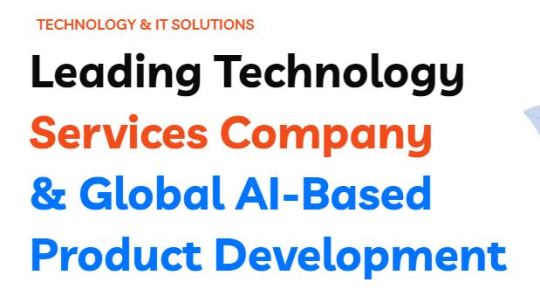
Tech Avtar is renowned for delivering custom software solutions for the healthcare industry and beyond. Our diverse range of AI Products and Software caters to clients in the USA, Canada, France, the UK, Australia, and the UAE. For a quick consultation, visit our website or call us at +91-92341-29799.
#software solution company#web based management system#Top Web development company in India#AI Chat bot company in India#Affordable software services Company#Top software services company in India#ai chatbot companies in india#Best product design Company in World#Best Blockchain Service Providers in India#Creating an AI-Based Product#best ai chat bot development platforms#Develop AI chat bot product for your company#AI Chat Bot Software for Your Website#Top Chatbot Company in India#Build Conversational AI Chat Bot - Tech Avtar#Best Cloud & DevOps Services#best blockchain development company in india#Best ERP Management System#AI Video Production Software#Generative AI Tools#LLMA Model Development Compnay#AI Integration#AI calling integration#Best Software Company in Banglore#Tech Avtaar#Tech aavtar#Top Technology Services Company in India
0 notes
Text
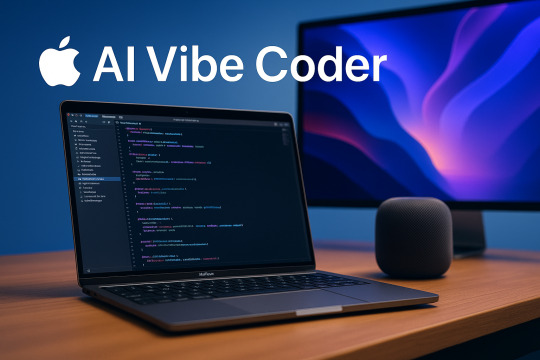
AI Vibe Coder is your go-to digital muse for all things coding and creativity. Blending AI-powered tools with a passion for sleek code and futuristic design, this blog explores the rhythm of modern development—from smart automation to aesthetic programming hacks. Follow for tech vibes, dev tips, and AI-driven inspiration.
#AI Vibe#Apple AI#Anthropic Claude#AI coding assistant#AI for developers#Xcode AI#Swift Playgrounds#AI programming tools#Claude 3#Apple developer tools#Generative AI coding#AI-powered IDE#Machine learning coding assistant#Code automation#Software development AI#ai latest update#artificial intelligence#ai news
0 notes